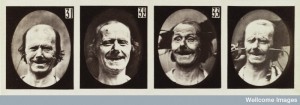
Four images showing a male having his face stimulated by electricity in an experiment on the electro-physiological expression of passions. Photograph, Guillaume Benjamin Amand Duchenne de Boulogne, 19th C (Wellcome Images). French neurologist Duchenne's experiments on the 'expression' of emotion was the topic of Johannes Buchholtz's talk which was part of the panel on 'Nineteenth-Century Science and the Production of Emotion'.
After months of planning, last week it was finally time for the Centre’s one-and-a-half day conference on the theme ‘Mastering the Emotions: Control, Contagion and Chaos, 1800 to the Present Day’. This international and interdisciplinary gathering of scholars with a passion for emotions brought together speakers from across Europe as well as from North and South America and Australia.
As you will have gathered from yesterday’s posts by Mark and Chris, we were treated to a fascinating mix of topics and approaches reaching across disciplinary and epistemological boundaries. Despite such a diverse range of papers, however, a number of themes seemed to re-occur, explicitly or implicitly, throughout the two days. These were questions of self-hood, of the relationship between the individual and society, of how different conception of ‘the emotions’ shape ideas about ‘personality’, ‘rights’, and ‘human nature’. These are vexing questions, not least because they are loaded with moral implications. What does it mean to talk about normal and abnormal – or pathological – emotions? What kind of value judgments are being weaved into systems of knowledge when claims are made about an individual’s emotions and personality from what can be ‘seen’ on a brain scan, or from what can be ‘revealed’ by the numerical result of a psychometric test? What are the implications when gendered ideas about ‘innate’ emotional responses are coded into law?
To speak about the emotions is to speak about the personal, the intimate. In the modern period, theories about the emotions have, as our speakers reminded us last week, been deployed to explain a range of human ‘behaviours’: from ‘self-mutilation’, to ‘criminality’, to the creation and reception of artistic objects, to ‘adolescence’, acting and performance, ‘attempted suicide’, and political espionage (to name a few of the themes). Such theories of emotions have been, and are, biological as well as social; historical and contemporary. Questions about what it means to be human seem to be at the heart of scholarly research into the emotions, whether such research is carried out within history, philosophy, sociology, psychology, politics, or neuroscience.
To sum up, ‘Mastering the Emotions’ proved to be an engaging and thought-provoking event. We want to thank all the speakers and delegates for their participation, and we hope that you all enjoyed the conference as much as we did! A special thanks to our keynote speakers, Allan Young and Sally Shuttleworth, who took time out of their busy schedules to come to Queen Mary and speak about their research. We would also like to thank everyone else who made this conference a possibility: first and foremost Tiffany Watt-Smith who has worked tirelessly for months to make this event come together, as well as the other members of the conference committee, Jade Shepherd and Elsa Richardson, and the the Centre steering committee, particularly Thomas Dixon and Rhodri Hayward. Last but not least we want to thank the Wellcome Trust for its support, and the Morgan Arms for serving up an excellent post-conference dinner!
Jen Wallis & Åsa Jansson
Image from the Wellcome Library, London: http://images.wellcome.ac.uk
